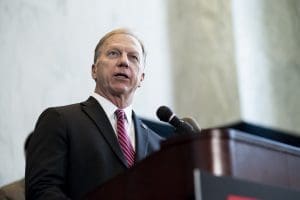103 House Republicans oppose dealing with debt the GOP helped rack up
GOP House members say they will not vote to increase the federal debt ceiling.

More than 100 House Republicans said on Monday that the United States should not default on its national debt — but that they would under no circumstances vote to prevent it from doing so.
In a letter led by Rep. Kevin Hern (R-OK) and obtained by Fox News, 103 GOP lawmakers blasted the Democratic majority for enacting both the popular American Rescue Plan and a $3.5 trillion budget resolution without a single GOP vote. As a result, they say, Democrats should also use their “unilateral ability to raise the debt ceiling to accommodate their unilateral spending plans.”
The letter says:
We should not default on our debts under any circumstances. If Democrats threaten a default, it will only be because they refuse to vote for the debt ceiling increase necessitated by their own irresponsible spending. … We, the undersigned Republican Representatives, are letting Democrat Representatives and the American public know that we will not vote to increase the debt ceiling, whether that increase comes through a stand-alone bill, a continuing resolution, or any other vehicle. This is a problem created by Democrat spending. Democrats will have to accept sole responsibility for facilitating it.
The list of signatories includes House Republican Conference Chair Elise Stefanik as well as the chairs of the conservative Republican Study Committee and Freedom Caucus.
Nearly every Senate Republican signed an identical letter on Aug. 10, promising not to help the Democratic majority address the debt limit. “We aren’t here to bail them out,” said Florida Sen. Rick Scott.
But contrary to the GOP’s suggestion, the debt ceiling increase is not about paying for President Joe Biden’s proposed $3.5 trillion plan to invest in clean energy, climate, child care, health care, and human infrastructure. Rather, it is necessary to pay for the spending Congress has already approved and the interest on the more than $28.7 trillion the government has already borrowed to pay for it.
According to the Treasury Department, the debt ceiling is the maximum “total amount of money that the United States government is authorized to borrow to meet its existing legal obligations, including Social Security and Medicare benefits, military salaries, interest on the national debt, tax refunds, and other payments.”
In 2019, Stefanik and a large bipartisan majority voted in favor of a budget deal that simply froze the debt limit for the remainder of the Donald Trump administration.
That two-year agreement expired July 31, forcing the Treasury to contemplate “extraordinary measures” to stave off a default.
Many of the same House Republicans who signed the letter helped rack up much of the existing debt. About $8 trillion of it was added during the Trump administration.
About $1.9 trillion came from the 2017 Tax Cut and Jobs Act, a massive tax cut for very wealthy individuals and corporations that passed without a single Democratic vote, and more than $3.1 trillion came from bipartisan pandemic relief.
A default could have a calamitous impact on the nation’s credit rating and its economy, the Treasury has warned: “Failing to increase the debt limit would have catastrophic economic consequences. It would cause the government to default on its legal obligations – an unprecedented event in American history. That would precipitate another financial crisis and threaten the jobs and savings of everyday Americans – putting the United States right back in a deep economic hole, just as the country is recovering from the recent recession..”
Congressional Democrats are hoping to pass legislation to avoid such a default when they return in September. But such an effort could run into a filibuster by the Republican minority in the Senate.
“I’m not gonna use the word confident,” Sen. Tim Kaine (D-VA) told Politico on Monday, speaking about the chances of getting such a measure through. “I’m gonna use the word optimistic.”
Published with permission of The American Independent Foundation.
Recommended

Biden calls for expanded child tax credit, taxes on wealthy in $7.2 trillion budget plan
President Joe Biden released his budget request for the upcoming fiscal year Monday, calling on Congress to stick to the spending agreement brokered last year and to revamp tax laws so that the “wealthy pay their fair share.”
By Jennifer Shutt, States Newsroom - March 11, 2024
December jobs report: Wages up, hiring steady as job market ends year strong
Friday’s jobs data showed a strong, resilient U.S. labor market with wages outpacing inflation — welcome news for Americans hoping to have more purchasing power in 2024.
By Casey Quinlan - January 05, 2024
Biden’s infrastructure law is boosting Nevada’s economy. Sam Brown opposed it.
The Nevada Republican U.S. Senate hopeful also spoke out against a rail project projected to create thousands of union jobs
By Jesse Valentine - November 15, 2023








































































